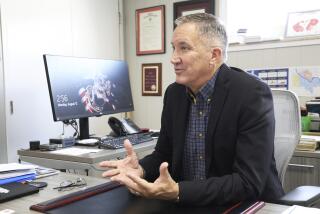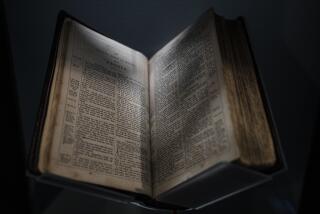No Blinders on Education
- Share via
The Koran is a holy book to millions, including many of the Arab Americans who volunteered to translate for the CIA after Sept. 11. Great, peace-loving men including Mohandas K. Gandhi have quoted from its pages. The University of North Carolina at Chapel Hill now wants incoming freshmen and transfer students to read an annotated portion of the Koran and then discuss it in small groups when the school year starts.
Such brief, thought-provoking, often timely summer reading assignments have become a standard tool for stimulating young brains during college orientation. But the North Carolina House of Representatives will have none of it and has banned funding for the project in a rough draft of the state budget.
Some representatives say promoting discussion of the Koran is inappropriate after 9/11. Others say the assignment would violate the separation of church and state.
We think they’re wrong on both counts and worry that they may be using insincere sensitivity and false concern for religious freedom to hide simple bigotry.
Since Islamist extremists slammed planes into the World Trade Center and Pentagon, government efforts to thwart terrorists have cut deep into the Constitution’s protections of individual rights. Most of these incursions involve due process and search and seizure.
So far, officials for the most part haven’t manhandled the 1st Amendment protections of free speech and religion. North Carolina--the first colony to formally call for independence from Britain--should know better than to lead such a dubious charge away from liberty.
The university is not endorsing Islam but rather is engaging in scholarly pursuit. Just as the Bible provides many of the cultural underpinnings for the West, so the Koran does for the more than 1 billion Muslims on the planet. Understanding Islam adds depth and complexity to students’ intellectual grasp of the tumult unfolding from Israel to India, Malaysia and the Philippines.
Religious texts, as a rule, are rich, complex and loaded with contradictions. The Koran is no exception. A close reading--at least of some translations--will turn up bellicosity, anti-Semitism and what many might interpret as clear antagonism to such democratic values as the separation of church and state. We would be appalled if any university, to massage multicultural good feelings on campus, glossed over the troubling parts of any book.
In North Carolina, however, legislators seem to be doing the opposite. One lawmaker objected to allowing freshmen to read about “our attackers.” Another called the Koran “evil.” Such ignorance threatens not only academic freedom but the constitutional freedoms the founding fathers fought to achieve. To broaden their world view, students should read the Koran. So should the North Carolina Legislature.
More to Read
Sign up for Essential California
The most important California stories and recommendations in your inbox every morning.
You may occasionally receive promotional content from the Los Angeles Times.










